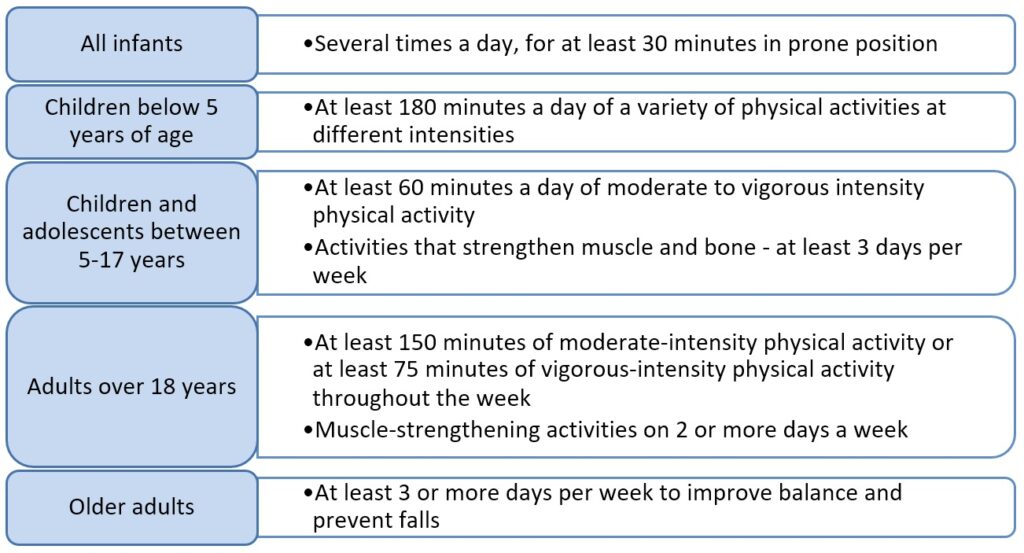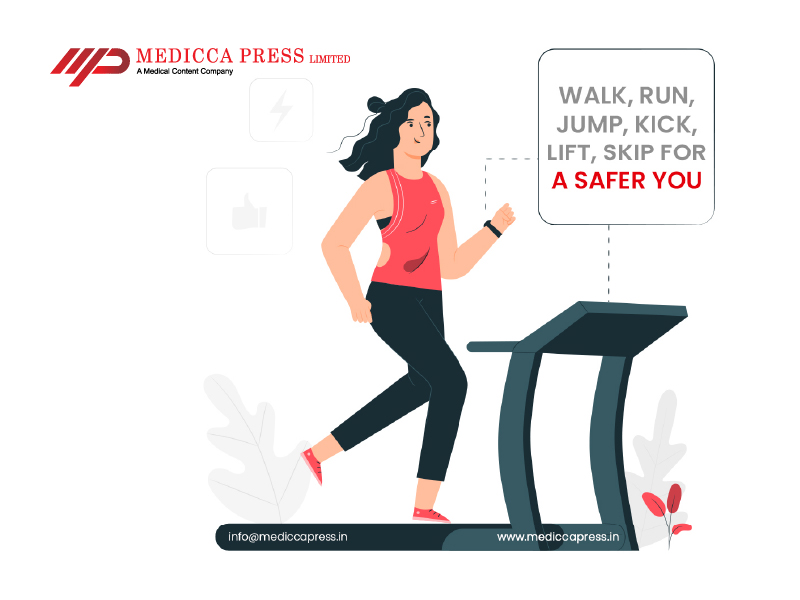The Coronavirus disease 2019 (COVID-19) pandemic has forced individuals to adopt a sedentary lifestyle, predisposing them to unhealthy weight gain, increased risk of obesity, high blood pressure, increased blood glucose levels, and psychosocial conditions such as anxiety and depression.1
The restricted lifestyle and diminished social contact, coupled with stress suggest the need to increase daily physical activity for a healthy lifestyle.2
In the current scenario, the World Health Organization (WHO) and Centers for Disease Control and Prevention (CDC) emphasize on the need for physical activity to create a positive impact on one’s immunity, mental well-being, physical function, and sleep quality.1,2
Physical activity benefits both – the mind and the body
- Improves cardiorespiratory function3
- Improves blood circulation and muscle activity4
- Reduces depression and eases anxiety and stress5
- Elevates self-esteem, improves concentration, reduces depressive symptoms, improves sleep5
- Improves glycemia, insulin levels, and lipid metabolism3
- Attenuates proinflammatory and procoagulatory states4
- Reduces alcohol dependence and abuse of other substances5
- Boosts immunity5
- Improves bone and muscle strength, flexibility, balance, thereby preventing falls and injuries in older people4
Regular physical activity improves physical function, mood, and enhances immune system to fight infections, and benefits overall physical and mental well-being.1-5
Physical activity – A modulator of the immune system
Regular physical activity strengthens the immune system against infections, including COVID-19 (Figure 1).3

Figure 1: Effects of physical activity on the immune system3
Tips to stay physically active at home
Frequency of exercise:
High intensity exercises for short periods (30–90 seconds), once or twice daily5
Types of exercises:
- Aerobic activities at home including brisk walk around the house, going up and down the stairs3
- Regular walks for elderly individuals and those with chronic medical conditions5
- Jumping jacks, climbing the stairs, standing and chair squats, push-ups, sit-ups, carrying groceries, etc.2,5
- Weight-lifting using exercise equipment or household items, such as textbooks, canned goods, milk-filled bottles5
- Activities like dancing, playing with children, daily work like gardening and cleaning2
- Meditation, yoga, and deep breathing exercises to relieve the mental stress2
Recommendations by the World Health Organization for physical activity2,3
- Physical activity for at least 150 minutes per week for adults or 75 minutes of vigorous physical activity, including muscle strengthening exercises, two times a week
- Physical activity for at least 300 minutes per week for children and adolescents
- Walking or stretching with short breaks every 30 minutes while sitting for longer duration
Physical activity by age – WHO recommendations4
In these challenging times, it is necessary to adopt minimum level of physical activity and healthy lifestyle, while maintaining social distance, to promote better physical and mental health.
References
- Ferreira MJ, Irigoyen MC, Consolim-Colombo F, et al. Physically active lifestyle as an approach to confronting COVID-19. Arq Bras Cardiol. 2020;114(4):601-2.
- Singh A, Kaur H, Kaur P. Role of physical activity during COVID-19 pandemic. IndianJ Clin Anat Physiol. 2021;8(2):83-5.
- da Silveira MP, da Silva Fagundes KK, Bizuti MR, et al. Physical exercise as a tool to help the immune system against COVID-19: An integrative review of the current literature. Clin Exp Med. 2021;21(1):15-28.
- #HealthyAtHome – Physical activity. World Health Organization [Internet]. 2020 [cited 2021 July 21]. Available from https://www.who.int/newsroom/campaigns/connecting-the-world-to-combat-coronavirus/healthyathome/healthyathome—physical-activity
- Importance of physical activity and exercise during the COVID-19 pandemic. Michigan Medicine. Department of Psychiatry [Internet]. 2021 [cited 2021 July 21]. Available from https://medicine.umich.edu/dept/psychiatry/michigan-psychiatry-resources-covid-19/your-lifestyle/importance-physical-activity-exercise-during-covid-19-pandemic

Leave A Comment